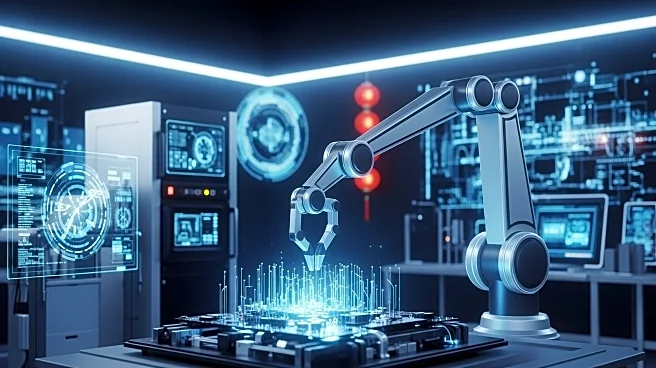What's Happening?
China's ruling Communist Party has announced a focus on accelerating self-reliance in science and technology, as part of its upcoming five-year development plan. This move comes in response to increasing
U.S. restrictions on access to semiconductors and other high-tech items. The announcement follows a four-day meeting where a draft of the plan was approved, highlighting the country's intent to counter external threats with domestic policy tools. The plan aims to deepen technological self-sufficiency, income redistribution, and transition to clean energy. China's leader Xi Jinping is expected to meet President Trump for talks in South Korea next week, amid ongoing trade tensions. The plan also emphasizes boosting domestic demand and spending, crucial for economic growth, with policies to increase consumption already in place.
Why It's Important?
The focus on self-reliance in science and technology is significant as it reflects China's strategic response to U.S. trade pressures, particularly in the tech sector. By enhancing domestic capabilities, China aims to reduce dependency on foreign technology, potentially reshaping global tech dynamics. This shift could impact U.S. tech companies that rely on Chinese markets, while also influencing global supply chains. The emphasis on clean energy and technological advancement aligns with global trends towards sustainability and innovation. Economically, China's push for increased domestic consumption could stabilize its growth amid external challenges, affecting global economic forecasts and trade relations.
What's Next?
China's full five-year plan will be revealed in March, following legislative approval. The upcoming meeting between Xi Jinping and President Trump may influence future trade negotiations, with China likely demanding more from the U.S. to reach a deal. Economists anticipate further measures to support domestic consumption by year's end, which could bolster China's economic resilience. The elevation of Zhang Shengmin to vice chair of the Central Military Commission underscores a focus on political loyalty and anti-corruption, potentially affecting military modernization efforts.
Beyond the Headlines
China's strategic shift towards self-reliance in technology could lead to long-term changes in global tech leadership, challenging U.S. dominance. The emphasis on clean energy and technological innovation may drive advancements in electric vehicles, robotics, and artificial intelligence, influencing global industry standards. The political purges within the Communist Party highlight internal power dynamics, with implications for China's governance and international relations.









